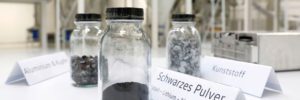
An industrial and scientific research consortium funded by Germany’s Federal Ministry for Economic Affairs and Climate Action plans to research and develop processes for recycling cathode metals, electrolytes and graphite multiple times. The HVBatCycle research consortium is planned to operate for 3 years.
“In order to have to use fewer materials from primary sources such as mines or salt flats, essential raw materials are to be recovered not just once, but several times,” says Volkswagen, a consortium leader.
The consortium’s research is aimed at mechanical-hydrometallurgical recycling. According to Volkswagen, this type of recycling is “characterized by low energy requirements and the possibility of a comparatively simple and decentralized distribution of certain recycling processes in Europe.”
To dismantle battery systems, the research will explore automated processes that provide nearly loss-free separation of active material and carrier foils, and the recovery of graphite and electrolytes.
Another area the research will examine is the “early and selective extraction of the lithium in soluble form as well as the leaching, precipitation and refining of contained metals as a mixed hydroxide concentrate,” says Volkswagen. “Here, in connection with the renewed material synthesis of cathodic active material, it will be investigated whether the separation of metal compounds is really necessary to produce new, fully high-performance cathode material.”
The consortium will be led by Volkswagen, and includes hydrometallurgical-manufacturing powder supplier TANIOBIS, vacuum, sensor and handling system company J. Schmalz, and x-ray measurement system company Viscom.
Volkswagen operates a pilot plant for mechanical recycling, and uses recycled material to produce new battery cells, at its Centre of Excellence in Salzgitter, Germany. TANIOBIS will build and operate hydrometallurgical and pyrometallurgical infrastructure for the research at the Chemiepark Oker site.
The consortium also includes the Institute for Metallurgical Process Engineering and Metal Recycling at RWTH Aachen University, which has infrastructure for testing recycling concepts, a pyrolysis furnace for processing battery modules, and a certified lab capable of studying battery recycling processes.
Source: Volkswagen


